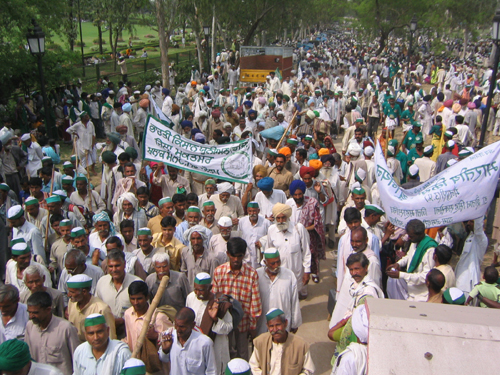
Archive 2009
|
November 16-30, 2007
Peasants march to parliament in support of their demands The significant demands made by the peasants are:
Taken together, these demands highlight basic concerns of peasants today. The working class supports the struggle of the peasantry on the principle that the peasants, who carry out the most important activity of producing food for the population, must be enabled to live with security, free from threat of ruination each year. MSP for all crops The demand of the working class that the government set a Minimum Support Price (MSP) for all crops at a price that will ensure security of livelihood is a just demand. It is the right of the farmer to be guaranteed a price for his crop that ensures a fair return on the cost of cultivation, and also ensures that he has enough to plan the next crop. However, the bourgeosie in power openly violates this right. Majority of peasants are not covered by MSP as the present MSP is applicable only for some regions and some crops. Successive governments of the bourgeoisie have denied the peasants this right. Instead, they have used their power to decide what should be the MSP and for which crop, and in which regions it should be applicable, as a weapon against the peasants. It is a weapon used to transform peasants into vote banks, and to divide the peasantry. Trade liberalization Opening up of agricultural commodities for exports as well as imports has impacted the peasants as well as urban population. A minority of rich cultivators may benefit temporarily from the lifting of curbs on the export of food crops and other agricultural produce. Imports of cotton, sugar and other commodities at the prevailing low world market prices have driven the price of domestic produce down. At the same time, big monopoly corporations have been enabled to take over agri-trade that bring them huge profits, as they procure directly from the peasants and sell the produce at many times its price in the urban markets. The liberalization of trade in agriculture has witnessed the entry of the biggest trading monopolies into agricultural trade and the emergence of a speculative market. The demand of the working class is that wholesale trade in agriculture must be nationalized. The State must procure from the cultivators and organize its distribution to the working population in the urban areas. All profiteering by private traders must be eliminated and offtake of produce from the peasant and remunerative prices for his produce must be ensured. The working class must support the demand of the peasants for the immediate payment of all arrears on their produce, such as those owed by the sugar mills to cane growers. Speculation and profiteering of agricultural produce must be halted immediately on the principle that trade in agriculture is oriented to satisfy the needs of the masses of working people as against the private gain of monopoly traders. No to Intellectual Property Rights The Seeds Act and the Patent (Amendment) Act were passed in 2004 in the face of strong opposition from the peasantry. Both these Acts restrict the rights of peasants over their own seeds and to grow traditional varieties of plants and grain once these products have been patented in any country. They strengthen the hands of monopoly seed companies that profit from sale of their seed to the peasant and to ensure that only the monopoly corporations control the production of certain plant varieties that command a high value for their special properties. The Seeds Act adversely affects the rich bio-diversity of Indian seeds and crops. The India-US Knowledge Initiative in Agriculture is one more measure that will enable the U.S based multi-nationals and Indian corporations to gradually take control of agricultural economy in our country. Under the guise of carrying out research to increase productivity and other purported aims, traditional knowledge and practices could be patented by the corporations and then denied to the very people who have been practising them for centuries. Capitalism means disaster India’s peasantry is drawing lessons from its own experience that the capitalist course being followed by the bourgeoisie means further destruction for those who till the land. Inexorably, agriculture is coming increasingly under the stranglehold of the biggest corporations. For 60 years, peasants have been fooled by false promises of the bourgeois governments. The bourgeoisie tells the peasantry that its future is secure under capitalism. This is a big lie. Further development of capitalism means further ruin and destruction of peasantry. The peasantry must no doubt raise its just demands before the government of the day. At the same time, it is time it looked for a real solution to its problems. This solution is that the working class and peasantry must establish their own rule. Together they will be able to ensure that agriculture is so planned as to fulfil the needs of the whole of society, as well as ensure secure livelihood for the peasants. |

